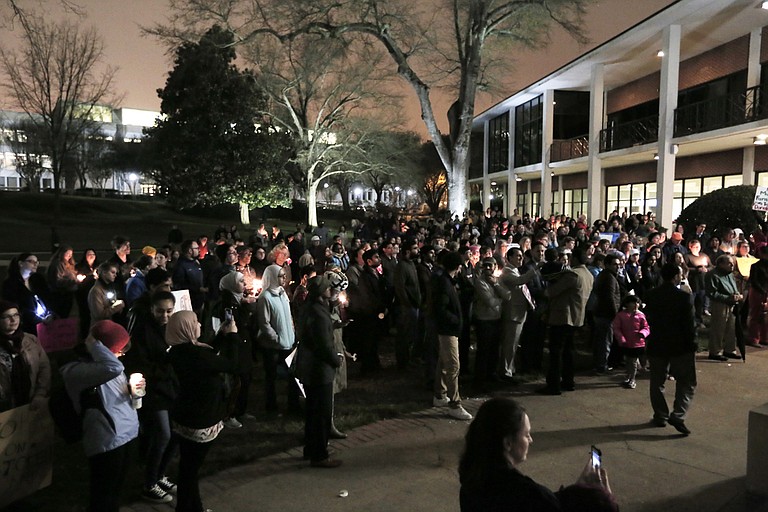Over a hundred Mississippians gathered at Millsaps College for a peaceful vigil in support of Muslims, immigrants and refugees potentially affected by executive orders President Donald Trump signed last week. Photo by Imani Khayyam.
Wednesday, February 8, 2017
If you think President Donald Trump's executive orders on immigration and refugee programs had no consequences for Mississippians, think again. Families will have to wait to be reunited. and if the courts do not block all of Trump's immigration order, the ban could directly affect the state's refugee minor program.
A few weeks ago, Trump cashed in on his hysterical campaign rhetoric about border walls and "threatening" immigrants by signing two executive orders that were immediately challenged nationally in courts in several states. Trump's orders had real, immediate consequences until the judicial branch put it on hold, including stopping people in airports, and further lengthening visa processes for those seeking to be reunited with their families. One elderly woman died because she couldn't get back to her doctor on time.
Trump's executive order on immigration, which includes the ban of seven predominantly Muslim countries, cites the 9/11 terrorist attacks more than once as a catalyst for the new administration's anti-terror approach. The problem is that there is little factual evidence that such policies fend off the threat of foreign-born terrorism, let alone an actual viable threat in the first place.
A recent Business Insider analysis of National Safety Council data estimates that the odds of death by terrorism as a whole, including foreign-born or homegrown terrorists, is one in 45,808. Americans have higher odds of dying bicycling, at the hands of police, in an airplane accident or in a heat wave than dying from what we classify as "terror."
Former government counterterrorism officials spoke out against the ban and told The New York Times that it doesn't make sense in terms of the U.S. involvement in countries overseas, like Iraq, and actually called the ban counterproductive to anti-terror efforts. So if the ban is meant to spread an irrational fear that politicians typically don't fan—ever seen a bill to reduce unlikely death by bicycling or at the hands of police?—and if it's counterproductive to preventing terrorism, what is the ban's purpose or real goal?
That's a question that the American people, and yes, Mississippians, need to mull as we watch the courts unfold precedents over the 45th president's attempt to control our republic's borders. If a travel ban doesn't enhance public safety, why do we need one in the first place? Government needs to be held accountable for its actions, and if irrational fear isn't good enough a reason to support a policy, turn your attention to the Mississippians around you that such policies affect.
Immigrant families are creating safety emergency plans in case of deportations. One family told a vigil crowd last week at Millsaps College of their two sons, both under age 15, stuck in Yemen waiting for visa interviews and trying to stay alive in the meantime in the war-torn country. These men and women and families are Mississippians, and it's time to stand up for them and love our neighbors.

Comments
Use the comment form below to begin a discussion about this content.
Sign in to comment
Or login with:
OpenID